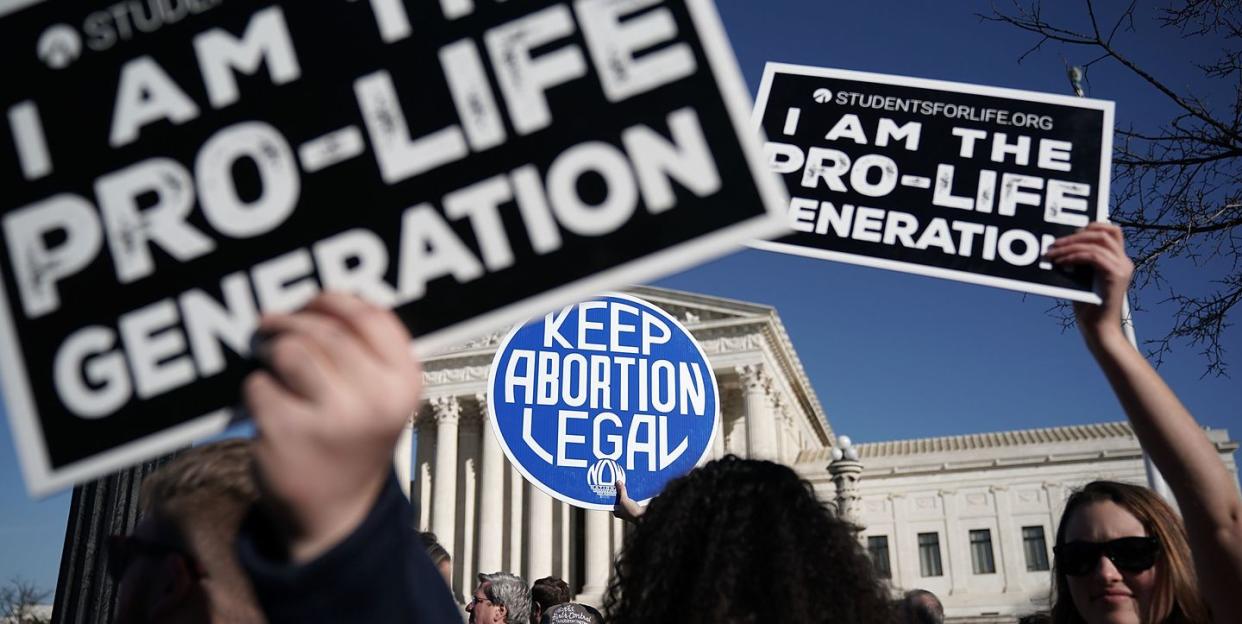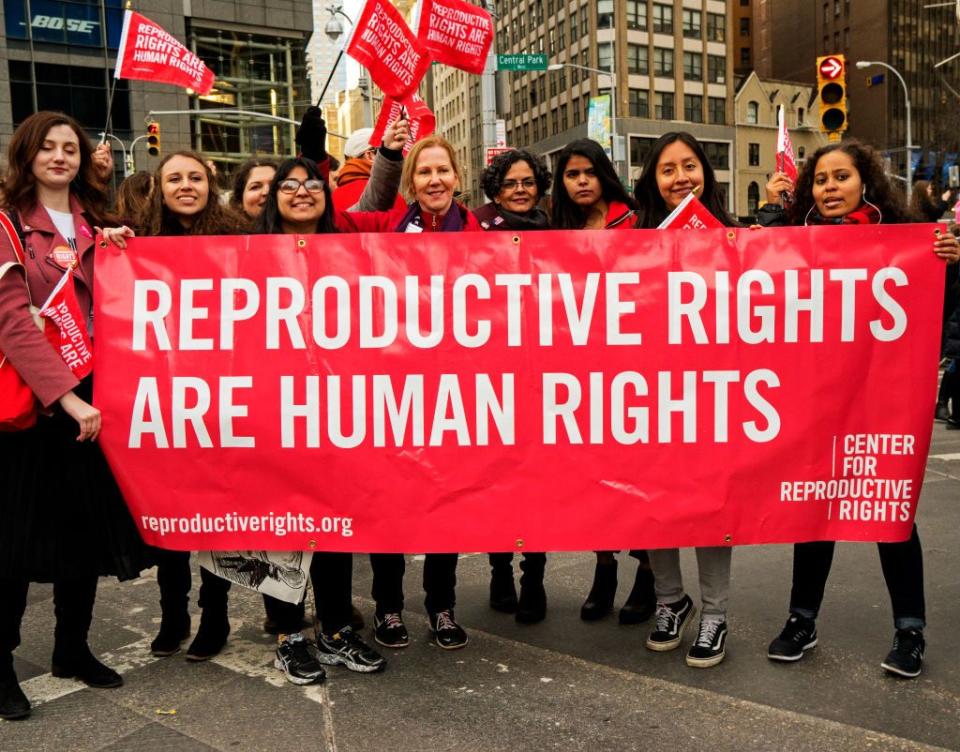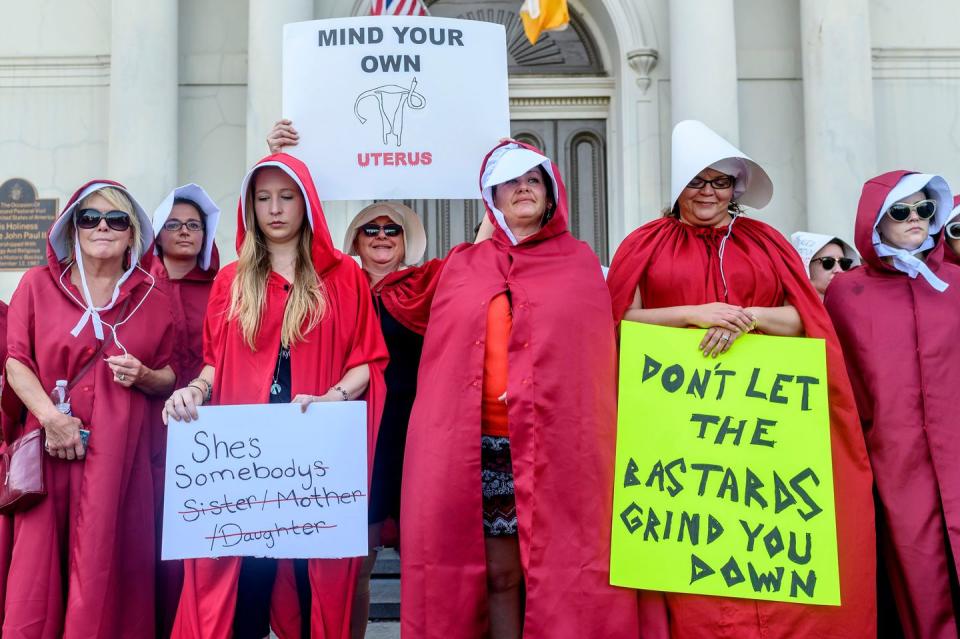What You Need to Know About the SCOTUS Case That Could Change Abortion Access

This Wednesday, oral arguments will begin in the Supreme Court for the case of June Medical Services v. Russo, the first significant abortion rights case of Trump's presidency. Depending on how the court rules, the outcome of this case could affect abortion access across the country—and forecast the future of Roe v. Wade. Ahead, find out all you need to know.
What is June Medical Services v. Russo?
June Medical Services v. Russo is the first big abortion cases that will be decided by the current Supreme Court, which includes Associate Justice Neil Gorsuch and Associate Justice Brett Kavanaugh, both of whom are regarded as conservative lawmakers.
The case concerns a Louisiana law passed in 2014, Act 620, that bars doctors from performing abortions in the state unless they have admitting privileges to a hospital within 30 miles of wherever they provide abortion care. This type of law is known within the reproductive rights community as a TRAP law, or Targeted Regulation of Abortion Providers, which Planned Parenthood describes as "costly, severe, and medically unnecessary requirements imposed on abortion providers and women's health centers."
This particular law is almost identical to a Texas law that was struck down by the Supreme Court in 2016 in the case Whole Woman's Health vs Hellerstedt. In Whole Woman's Health, the admitting privileges law was deemed unconstitutional because it placed an "undue burden" on abortion access. However, before the Supreme Court ruled on the case, the law caused half of all Texas' abortion-providing clinics to close. (NPR reports that Texas currently has 22 clinics for the state's 29 million people. Louisiana passed its law a year after Texas' passed.)
The Center for Reproductive Rights, a legal advocacy organization that focuses on reproductive health, will argue against the Louisiana law in court; the Center also argued against the Texas law in Whole Woman's Health.
Why is it difficult for abortion providers to have admitting privileges?
Doctors obtain admitting privileges when they are regularly sending patients to the hospital. Since abortions are such safe procedures, it is rare that a patient would need to go to a hospital, and therefore abortion advocates say it is difficult for an abortion provider to obtain such privileges. Also, if a patient did need to go to a hospital, they would be admitted even if their doctor did not have privileges. Privileges can also be denied for any number of reasons.
The American Medical Association and the American College of Obstetricians and Gynecologists filed an amicus brief in the case that asserts these admitting privileges laws are "medically unnecessary." But according to the New York Times, Louisiana's attorney general argues the opposite, saying that an admitting privileges law protects the safety of patients and ensure the competency of doctors.
What could happen to abortion services in Louisiana?
If the Supreme Court decides to ignore the precedent set in Whole Woman's Health and instead uphold the Louisiana law, only one abortion clinic could remain open in the state.
According to the Center for Reproductive Rights, this would leave one abortion-providing doctor for about 1 million women of reproductive age in Louisiana. Of those women, about 10,000 seek abortions in the state every year. Beyond Louisiana, if the law is upheld, the ruling could also encourage other TRAP laws to be passed around the country.

As Vox reports, "If the Louisiana law is upheld, states could potentially require abortion doctors to obtain more and more difficult-to-obtain credentials, while simultaneously requiring the clinics themselves to pay for millions of dollars in unnecessary equipment. Eventually, these burdens would become so great that no abortion clinic could afford to operate, and the right to an abortion would cease to exist in states led by anti-abortion lawmakers."
There's also another part to this case, which has to do with the concept of third-party standing, or whether abortion providers are allowed to challenge abortion laws on behalf of patients. While typically someone cannot sue on behalf of someone else, the Washington Post reports that the Supreme Court said in 1976 that "abortion providers are an exception because of their close relationship with their patients and because privacy concerns make it hard for patients to bring their own lawsuits." Louisiana is claiming that providers should not have third-party standing since “abortion clinics do not have their patients’ best interests at heart,” according to the New York Times. But if patients did have to litigate for themselves, Vox reports that "abortion patients may be hindered in their ability to assert their rights, in no small part because someone seeking an abortion is likely to give birth before their rights are fully litigated."
When will we find out the ruling?
A decision is expected this spring or summer, but it's important to consider the makeup of the court when thinking about a ruling. Back when the Supreme Court ruled in Whole Woman's Health, Justice Kennedy was still on the court and, according to Vox, was the key fifth vote in striking down the law. Now with Kennedy gone and Gorsuch and Kavanaugh on the bench, it's more likely that the Court could uphold the law.
As U.S. News and World Report reports, the outcome could come down to Chief Justice John Roberts, who has voted for abortion restrictions in the past. However, he also voted to prevent the Louisiana law from being enforced while the case played out in court.
Steven Schwinn, a law professor at the University of Illinois Chicago told The Hill, "Roberts has as much if not more of an interest as anyone in the public face and integrity of the court. He is acutely aware that if the court were to take dramatic actions in the Louisiana case, like overturning Hellerstedt, it would widely be seen as a sheer political move."
What is the current state of abortion in Louisiana?
Louisiana already has a 24-hour waiting period for anyone looking to obtain an abortion in the state, which is extra burdensome for patients. Hope Medical Group for Women (the plaintiff in the case) is one of the few abortion-providing clinics in Louisiana and has dealt with various TRAP laws over the years; the clinic reports that 70 to 80 percent of its patients live at or below the federal poverty line.

Jasmine Rivers, a 29-year-old Planned Parenthood patient, spoke to ELLE.com about her experience obtaining an abortion at Hope in 2015. She explained that she spent three weeks traveling to an anti-abortion crisis pregnancy center, thinking that they would help her with an abortion. When it became clear that was not the case, she found a clinic 250 miles away. However, due to Louisiana’s laws, she had to go for a counseling session and then return at least 24 hours later for the abortion.
“It was a lot of wasted time,” she said. “It was a lot of feeling used and like people were pushing their own agendas through me instead of just listening to what I was asking for, what I was saying I wanted to do with my body. I just worry that with this decision, they're not really looking at the people who will actually be affected by it.”
What can you do?
If you're going to be in Washington D.C. on March 4, abortion rights activists, including celebrities like Busy Philipps and Elizabeth Banks, will be participating in a rally outside the Supreme Court. (You can also watch a livestream of the rally here.)
You Might Also Like

